
*
The big "money shot" in Roland Emmerich's 1996 alien-invasion epic, "Independence Day," had the White House being zapped to smithereens. It capped the previews, helped the film earn $816,969,268 and got an Oscar for visual effects.
Well, essentially, that's what the director does to Shakespeare in "Anonymous," a hysterical historical that brazenly reassigns credit for the Bard's plays and poetry to Edward de Vere, 17th Earl of Oxford. The film bows Oct. 28, and the police tape is up.
This authorship question has been raging off-screen for centuries but more frequently and more intensely for 150 years. It's hardly the majority view, mind you, and most academics give it less credence than the [Francis] Bacon theory and the [Christopher] Marlowe theory, but this is the first time the "Oxfordian theory" has been translated into a screenplay that boldly presents itself as fact.
"It's not our theory," insists screenwriter John Orloff, who has gone where no theorist has gone before (unless you count the established, company-line "Stratfordians," who have always held that Shakespeare wrote his own stuff).
| |
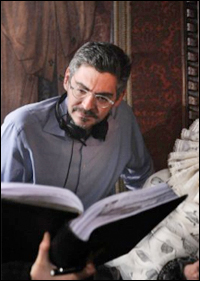 |
|
| Screenwriter John Orloff | ||
| photo by Reiner Bajo – © 2011 Columbia TriStar Marketing Group, Inc. |
"There is a reason why four Supreme Court Justices don't think William Shakespeare wrote the plays, and the reason they don't think he did is that the law in Shakespeare is incredibly accurate, 16th-century law. In fact, for a couple of hundred years, people thought William Shakespeare must have been a lawyer or law clerk. We don't think that anymore because there is no record of him going to law school.
"We didn't make a documentary. We made a movie, and we can't say it more clearly than the opening moments where we have an actor on a theatre stage [Derek Jacobi at the Broadhurst] introducing the movie, saying it's a piece of theatre. This is a movie about the intersection of art and politics. It's about: 'Is the pen mightier than the sword?' We're just using that story to talk about that bigger truth."
| |
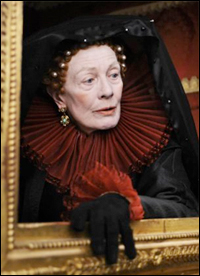 |
|
| Vanessa Redgrave in "Anonymous." | ||
| photo by Reiner Bajo – © 2011 Columbia TriStar Marketing Group, Inc. |
If anything, "Anonymous" is Emmerich in a restrained mode, more cerebral and less costly (a mere, but splendidly spent, $26 million — thanks to the miracles of CGI). Most of his energies went into matching the right actors with the right roles.
"I have to say, it was the longest casting I ever did," the director readily admits, "and it was the most interesting casting I ever did because I didn't want to put people in boxes. I was, in a way, getting out of the box myself, and I didn't want to box other people in one. I didn't tell most of the people I met what part I was seeing them for. I just wanted to talk in general about the script first, and then I would always ask the most important question: 'Which part in the movie would you like to play?'"
| |
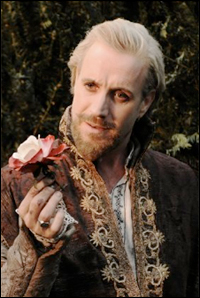 |
|
| Rhys Ifans in "Anonymous." | ||
| Columbia Pictures |
Ifans, who resembles a slightly older Ryan Gosling when brooding darkly, doesn't have the role all to himself. The film flashes back and forth over two different time zones in Elizabethan history some four decades apart. The young Earl of Oxford is played by Jamie Campbell Bower — a good physical facsimile.
"I guess that was Roland's astute eye," reckons Ifans. "I was just over the moon to have someone as good-looking as Jamie [represent me] because I never looked that good when I was his age. All I said to him was 'Make me look good in the sack.'"
According to Oxfordian speculation, the young earl was granted a privileged, book-cracking upbringing because he was the illegitimate son of the 15-year-old Queen Elizabeth. Later, he has another day in court, unwittingly committing incest with his royal mother and producing a son/brother. The earl who would be Shakespeare, it seems, is the man who would be king — save for those damn "virgin queen" theorists.
Vanessa Redgrave plays the elderly Elizabeth, reeling through a court thick with intrigues whirling around the pressing question of her successor. De Vere enters the fray with Henry V, which favored the Essex line over the Cecil line, but, just to be on the safe side, he asks playwright Ben Jonson to take the credit. When Jonson declines, up pops Shakespeare, ready to be Front Man of the Ages.
| |
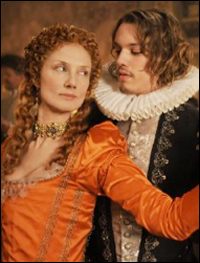 |
|
| Joely Richardson and Jamie Campbell Bower in "Anonymous." | ||
| Columbia Pictures |
And, no, unlike Ifans, Redgrave had no advice for her younger self. "I know what my mother's image is — I know how she's perceived," Richardson allows, "but, as a mother, she is like Miss Sweetheart. She would never say anything [negative]. She's totally supportive and kind and not bossy at all. I'm the bossy one."
This mother-daughter act is not unprecedented. It jump-started Richardson's career. "I was still at drama school, and my mother was doing a film by David Hare, 'Wetherby.' I did the flashbacks of her as a teenager because I was a teenager then."
The authorship issue motivating this movie was not news to Ifans. "There is no absolute answer about who the author of these works is," he stresses. "I was kind of aware of the Bacon theory and the Marlowe theory and blah blah blah, but, having been offered this part, I obviously had to research Oxford a great deal. Oxford's life is very, very well-documented — much more so than William of Stratford, certainly.
"In reading Shakespeare's work," he continues, "you have to accept that whoever penned these plays would have had to have been well-traveled, would have most certainly been a multi-linguist and would, without a shadow of a doubt, have had to have a unique insight and knowledge into the workings and political dynamics of a very secretive, paranoid Elizabethan court. Edward de Vere ticks all those boxes. William of Stratford, on the other hand, doesn't. Do I believe it was Edward de Vere? I'm not 100 percent convinced. All that I am convinced of is that whoever wrote these works was a genius, and I think it is our duty as actors, directors and spectators to question or offer possibilities as to who wrote these plays because that can only illuminate the plays in a different way. And I also think whoever wrote these plays — we owe it to him or her or them to ask this question. It would be a crime not to."
Unlike Ifans, Richardson pleads oblivious to the issue. "I was completely unaware of the authorship question, and I say that with no pride whatsoever. Now, I feel like a total ignoramus. How could I have possibly not known about it? When Roland approached me and my mom about this, I still thought, 'Interesting, but I doubt it.' Then I started to read up on it, and then I got really, really interested. It becomes fascinating, and then suddenly I realize that it's a hundred-year old debate.
"There are so many interesting facts, but what I think really is interesting is the whole story: that it makes it a mystery, that the plays themselves are so incredible in that they literally encompass every human story — y'know, from tragedy to romance to a historical place. The more you research it, the more interesting it gets.
"I see this as an absolute celebration of the work. Roland has a story about a particular theory, which at times is a romantic one. I love the idea about how discombobulated love is. I love that he and John Orloff have opened up the debate. It's not a controversy. It's not a bashing of Shakespeare. It's an exploration of it."
| |
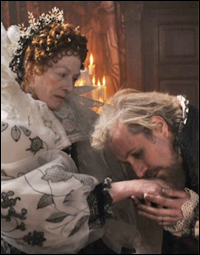 |
|
| Vanessa Redgrave and Rhys Ifans in "Anonymous." | ||
| photo by Reiner Bajo – © 2011 Columbia TriStar Marketing Group, Inc. |
Richardson seconds that, pointing out that the film "Shakespeare in Love" also "caused a controversy, and there are all sorts of fudging of historical details in that, but no one got upset. Now, they're picking on every single detail [in "Anonymous"]. It's a story about that time, as 'Shakespeare in Love' was a story about that time."
Fact and fiction often blur, they mutually concur, with Ifans adding the corker: "The glorious threesome — fact, fiction and truth — sleep and roll around in the same bed."
Regardless of who wrote Shakespeare, the two actors have made a pretty decent living performing him, and some plays resonate more with them than others do.
"I haven't played Hamlet, but I have studied it and worked on it in various shapes and forms, and I think Hamlet, in particular, isn't a character," proffers Ifans. "That's why he's so appealing to play. It's a state of mind, and the way Shakespeare speaks of loss and grief 500 years before Freud personified it is extraordinary. That's why that role is revisited so often. With Hamlet, you can only apply all of you to make it work. With other characters, there are signals or messages in the play that might form who that character is, but Hamlet is very much a state of mind. "I think the play that intrigues me most now, as a youngish man, is the part that I couldn't possibly play right now, which is King Lear, but I hope I will grow old and graceful and strong and brave enough to get my teeth into it one day."
| |
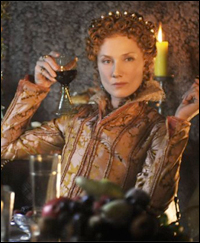 |
|
| Joely Richardson in "Anonymous." | ||
| photo by Reiner Bajo – © 2011 Columbia TriStar Marketing Group, Inc. |
"For some reason, I love Twelfth Night — the idea of mixed identities, a theme throughout all of his plays. The whole merging of the sexes I find really interesting. And last night I was reading The Tempest and thinking about Prospero. They say whoever Shakespeare was, that was him saying goodbye to the world and moving on, and I find that profoundly moving. So maybe those are my top three."
As stage-trained actors, Ifans and Richardson were surprised, if not unnerved, by Emmerich's method of throwing them into scenes without rehearsal. "It was like jumping out of an airplane and landing in Elizabethan England," Ifans admits. "I'll be honest: there was zero rehearsal time. I think that's a testament to Roland's casting. In saying that, though, the live theatre pieces you see in the film were assembled several weeks before we started shooting so the theatre stuff was well rehearsed."
Punctuating the story proper are sequences in which Shakespeare is performed for the first time. "Because Roland was going to be busy placing cameras and directing the bigger picture, he hired Tamara Harvey to kinda cast this acting troupe and then put together these stage plays," recalls screenwriter Orloff. "She came to me once and said, 'Oh, John, I can't believe I have to stage Macbeth with the three witches. It's been seen a million times before.' I said, 'But, Tamara, not to this audience. This is where the cliché is made. It is not a cliché yet, and the excitement is in this audience — the fear of the witches or playing Julius Caesar not in fascist costumes as Orson Welles did — but to have that immediate first-time experience of never seeing it before.' And it did liberate her. I could see her eyes get excited."
| |
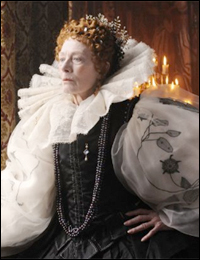 |
|
| Vanessa Redgrave in "Anonymous." | ||
| photo by Reiner Bajo – © 2011 Columbia TriStar Marketing Group, Inc. |
Orloff was likewise impressed with these scenes. "One of the things I really loved about the movie was seeing how Shakespearean drama was presented in the 16th century, how the actors would leave the stage and go into the audience," he says. "The audience was part of the performance, literally. There's that moment in the movie when Henry V is doing the St. Crispin's Day speech — y'know, 'We few, we happy few, we band of brothers' — and he kneels down, and everybody in the audience reach out to him. That was undirected and unscripted. They just did it."
It helped that some of these sequences were performed by Mark Rylance, who has already accumulated a couple of Tonys without ever showing Broadway his classical side. (It leans toward legendary in England.) "I'm a great, great admirer of him anyway, and it was such a thrill to meet him," admits Emmerich. "I just have never met a friendlier, nicer, more soft-spoken, intelligent man as Mark Rylance. We went two or three times for dinner, just to chat about things. He wanted to tell me a couple of things he found. I also asked him at one point, 'Can you help us?' — and he said 'Anytime.' And he helped us quite a lot — for example, finding Tamara."
Which leaves Orloff with one last nail to drive in: "Mark was the artistic director of The Globe for ten years and doesn't believe Shakespeare wrote the plays. The guy who ran The Globe theatre for a decade doesn't think Shakespeare wrote the plays."
The defense rests, for now . . .
Harry Haun is a longtime staff writer for Playbill magazine. He pens Playbill.com's popular Playbill On Opening Night column.










